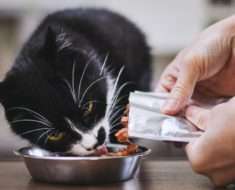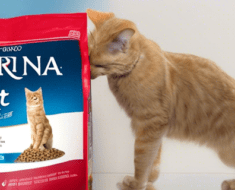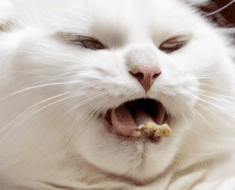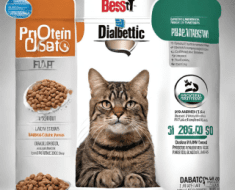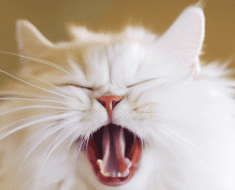Cats should eat kitten food until they are around 1 year old or reach their adult weight. As a responsible cat owner, you may be wondering how long should cats eat kitten food.
The nutritional needs of a kitten are different from those of an adult cat. Kitten food is specifically formulated to support their rapid growth and development during the first year of life. It is crucial to provide your kitten with a balanced diet rich in essential nutrients until they are around 1 year old or reach their adult weight.
We will explore the importance of feeding your cat the right food at the right stage of life and offer tips on transitioning from kitten to adult food seamlessly.
When To Transition To Adult Food
Transitioning cats to adult food requires paying attention to signs of readiness. Common signs include weight consistency and regulating food intake. Begin transitioning around 12 months old by mixing adult food with kitten food. Slowly increase the adult food ratio over a period, usually 1-2 weeks. Monitor your cat’s response closely. Consult with a veterinarian before making a complete switch. Gradual transition is crucial to prevent digestive issues. Maintain a balanced diet and sufficient hydration, transitioning caringly is essential for cat’s health.

Credit: www.bellaandduke.com
Nutritional Needs Of Kittens Vs. Adult Cats
Kittens have different nutritional needs than adult cats and should be fed kitten food until they reach one year of age. Kitten food contains more protein and calories to support their growth and development, while adult cats require a balanced diet to maintain their health.
It’s important to switch to adult cat food at the right time to ensure proper nutrition.
| Kitten Food: | Higher in protein and fat |
| Adult Cat Food: | Lower in protein and fat |
| Vitamins & Minerals: | Kittens need more for growth |
Health Considerations
Weight Management and Obesity: Maintaining a healthy weight is essential for cats to prevent obesity-related health issues. Proper portion control of kitten food can help in weight management and ensure that your cat maintains an ideal body condition. You should monitor their body condition score and adjust their diet as needed.
Digestive Health: Transitioning to adult cat food at the right time is crucial for digestive health. Gradually introducing adult food while reducing kitten food can prevent gastrointestinal discomfort. It’s important to monitor their stool quality during the transition to ensure their digestive system adapts smoothly.
Transitioning Strategies
When transitioning kittens to adult cat food, it is important to introduce the new food gradually. Start by mixing a small amount of adult food with their kitten food, gradually increasing the proportion of adult food over a period of 7-10 days. This allows their digestive system to adjust to the new food without causing any stomach upsets or digestive issues. Additionally,Monitoring your cat’s appetite and body condition throughout the transition process. If your cat is losing weight or not eating well, you may need to slow down the transition or consult your veterinarian for guidance.
It is important to monitoring and adjust the quantity of food based on your cat’s individual needs. Every cat is different and the amount of food they require may vary. In addition, Observe your cat’s body condition and weight to ensure they are getting the right amount of nutrition. Moreover, If your cat is becoming overweight, you may need to reduce the amount of food or switch to a weight management formula.In conclusion, Gradually introducing adult food and monitoring and adjusting the quantity of food will ensure a smooth transition to their adult diet while providing them with all the essential nutrients they need.
Consulting A Veterinarian
Consulting a Veterinarian is crucial when it comes to determining how long cats should eat Kitten Food. Seeking professional guidance ensures tailored recommendations based on your cat’s unique needs. Veterinarians have the expertise to assess your cat’s age, weight, health condition, and overall development. They can provide you with specific instructions on the duration of kitten food consumption, taking into account factors such as breed, size, and any existing health issues. With their knowledge, they can guide you on when to transition your cat to adult cat food to ensure a balanced diet and optimal growth. Regular visits to a veterinarian also allow for monitoring your cat’s progress and making any necessary adjustments to their dietary needs along the way.
Credit: www.businessinsider.com

Credit: www.animaltrust.org.uk
Frequently Asked Questions Of How Long Should Cats Eat Kitten Food
When Should Cats Stop Eating Kitten Food?
Cats should stop eating kitten food around 12 months old. Transition to adult cat food gradually to support their changing nutritional needs.
Can A 6 Month Old Kitten Eat Adult Cat Food?
A 6-month-old kitten can eat adult cat food, but it’s recommended to feed them kitten-specific food for proper growth and nutrition.
Is It Ok To Feed Adult Cats Kitten Food?
Feeding adult cats kitten food isn’t recommended. Adult cats have different nutritional needs. Kitten food may lack necessary nutrients for adult cats.
How Long Should You Feed Kitten Wet Food?
Feed kittens wet food until they reach 1 year old. This provides the necessary hydration and essential nutrients they need to grow and develop properly. Make a gradual transition to solid food after this period, while still offering wet food as a supplement.
It’s important to consult with a veterinarian for specific feeding guidelines for your kitten’s breed and health.
Conclusion
The timing to transition cats from kitten to adult food varies. Pay attention to their growth and energy levels. Consult your vet for personalized advice. Remember to gradually switch their diet to prevent digestive issues. Proper nutrition ensures a healthy adult cat.
Let them thrive!
